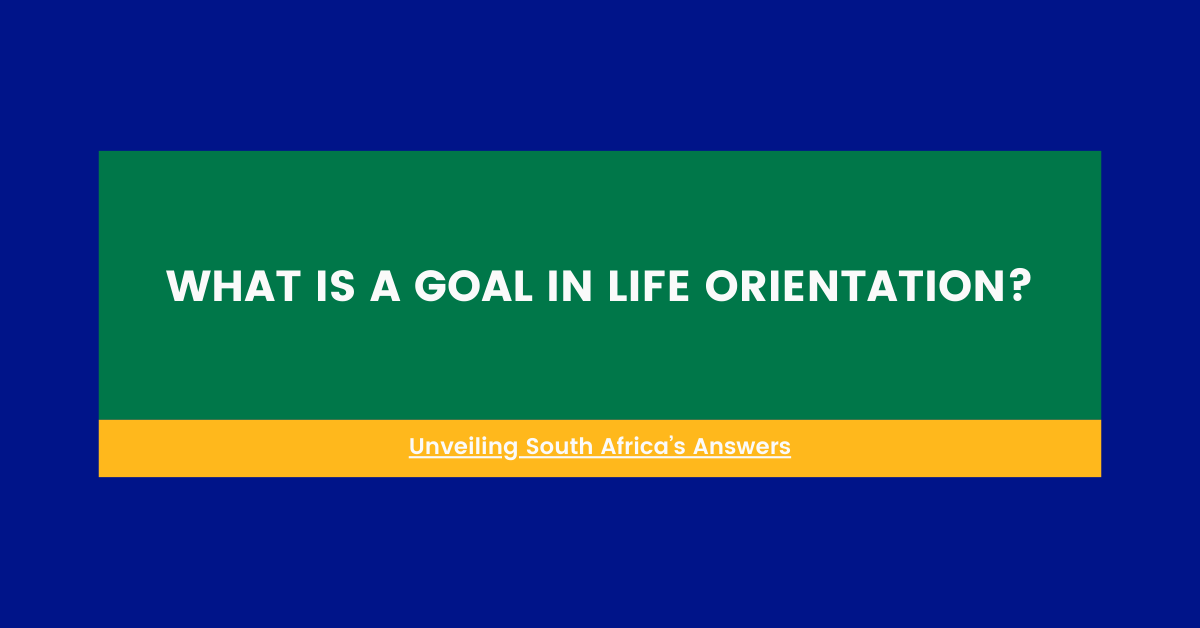In South Africa, Life Orientation is a crucial subject that forms part of the national curriculum. It aims to equip learners with essential life skills, knowledge, and values to navigate the complexities of modern society. Understanding goals in Life Orientation is key to grasping the subject’s importance and its impact on students’ personal and social development.
Understanding Life Orientation in South Africa
Before delving into goals, let’s first understand what Life Orientation entails in the South African context:
- Life Orientation is a compulsory subject for all learners from Grade R to Grade 12.
- It covers various topics including personal well-being, citizenship education, physical education, and career guidance.
- The subject aims to develop well-rounded individuals who can contribute positively to society.
Defining Goals in Life Orientation
A goal in Life Orientation refers to a specific outcome or objective that the subject aims to achieve in a learner’s personal, social, intellectual, and physical development. These goals are designed to:
- Enhance self-awareness and personal growth
- Promote healthy lifestyle choices
- Foster responsible citizenship
- Develop critical thinking and decision-making skills
- Prepare learners for future careers and further education
Key Goals of Life Orientation in South Africa
Let’s explore the main goals of Life Orientation in more detail:
Personal Well-being
- Develop self-esteem and confidence
- Promote emotional intelligence and mental health awareness
- Teach stress management and coping skills
- Encourage self-reflection and personal goal setting
Citizenship Education
- Foster understanding of human rights and responsibilities
- Promote awareness of social issues in South Africa and globally
- Encourage active participation in community service
- Develop an appreciation for diversity and social cohesion
Physical Education and Health
- Promote regular physical activity and fitness
- Teach about nutrition and healthy eating habits
- Raise awareness about substance abuse and its prevention
- Educate on sexual and reproductive health
Career Guidance
- Help learners explore various career options
- Develop job-seeking and entrepreneurial skills
- Assist in making informed decisions about further education
- Teach financial literacy and money management
Study Skills and Academic Development
- Enhance time management and organizational skills
- Develop effective study techniques
- Promote critical thinking and problem-solving abilities
- Encourage lifelong learning
The Importance of Goals in Life Orientation
Setting clear goals in Life Orientation is crucial for several reasons:
- Direction: Goals provide a clear direction for both educators and learners.
- Motivation: Well-defined goals motivate learners to engage actively with the subject.
- Measurement: Goals allow for the assessment of progress and effectiveness of the curriculum.
- Relevance: They ensure that the content remains relevant to learners’ lives and societal needs.
- Holistic Development: Goals in Life Orientation contribute to the overall development of learners.
Implementing Goals in Life Orientation
To effectively achieve these goals, Life Orientation educators in South Africa use various strategies:
- Interactive Learning:
- Group discussions
- Role-playing exercises
- Debates on current social issues
- Practical Activities:
- Physical education sessions
- Community service projects
- Career expos and job shadowing
- Reflective Practices:
- Journaling
- Self-assessment exercises
- Peer feedback sessions
- Technology Integration:
- Online research projects
- Educational apps and games
- Virtual career exploration tools
Challenges in Achieving Life Orientation Goals
While the goals of Life Orientation are well-intentioned, there are challenges in their implementation:
- Resource Constraints: Some schools lack facilities for effective physical education or career guidance.
- Cultural Sensitivity: Addressing topics like sexuality education requires careful consideration of diverse cultural backgrounds.
- Teacher Training: Ensuring all educators are adequately trained to cover the broad spectrum of Life Orientation topics.
- Time Allocation: Balancing the various components of Life Orientation within limited class time.
- Assessment Methods: Developing appropriate ways to assess soft skills and personal development.
The Role of Stakeholders in Achieving Life Orientation Goals
Successful implementation of Life Orientation goals requires involvement from various stakeholders:
- Educators:
- Continuously update their knowledge and teaching methods
- Create a safe and inclusive learning environment
- Parents and Guardians:
- Reinforce Life Orientation lessons at home
- Engage in their child’s personal and social development
- Community Members:
- Provide opportunities for community service and career exposure
- Support school initiatives related to Life Orientation
- Government and Education Department:
- Regularly review and update the curriculum
- Provide necessary resources and training for educators
Life Orientation and the South African Context
The goals of Life Orientation are particularly relevant to the South African context:
- Addressing Social Issues: Topics like HIV/AIDS awareness, gender equality, and racial reconciliation are crucial in post-apartheid South Africa.
- Economic Empowerment: Career guidance and entrepreneurship education aim to address high youth unemployment rates.
- Nation Building: Citizenship education promotes social cohesion in a diverse society.
- Health Promotion: Combating lifestyle diseases and promoting mental health are national priorities.
Measuring Success in Life Orientation
Assessing the achievement of Life Orientation goals involves both quantitative and qualitative methods:
- Formal Assessments:
- Written tests and assignments
- Practical assessments in physical education
- Portfolio Development:
- Learners compile evidence of their personal growth and achievements
- Observation:
- Educators monitor changes in learners’ behavior and attitudes
- Feedback Mechanisms:
- Surveys and interviews with learners, parents, and teachers
- Long-term Impact Studies:
- Tracking learners’ progress beyond school years
The Future of Life Orientation in South Africa
As South African society evolves, so too will the goals of Life Orientation:
- Digital Citizenship: Increasing focus on responsible online behavior and digital literacy
- Environmental Awareness: Greater emphasis on sustainability and climate change education
- Mental Health: Enhanced focus on emotional well-being and resilience
- Entrepreneurship: More practical skills for self-employment and innovation
- Global Competencies: Preparing learners for an increasingly interconnected world
